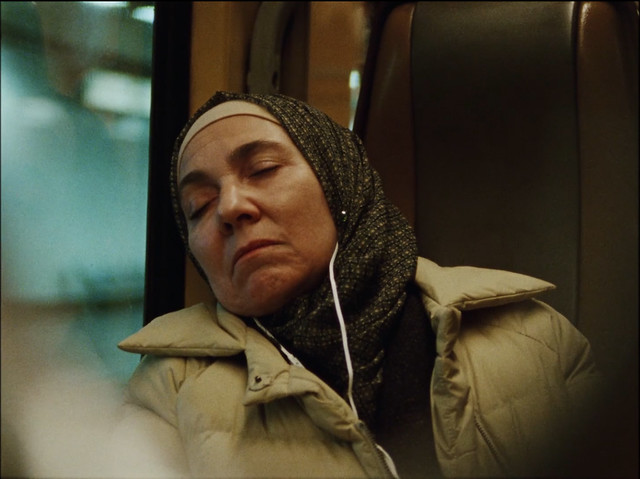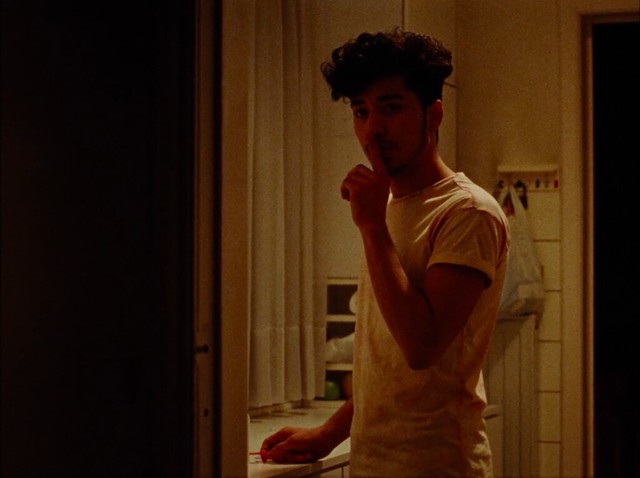







Flemish director Bas Devos' debut Violet had made an indelible impression on me back in 2015 when I caught it in New Directors/New Films series. With his painterly frames and quiet yet effective use of sound design made it one of the most memorable debut films in recent memory. Ghost Tropic, his new film, not only is just as beautiful and lyrical as Violet, it also quietly reinforces solidarity and comfort in humanity, not as so much words, but rather in images.
It starts with a static shot of an ordinary living room. Devos holds it for a good 3 minutes. Lights change and day becomes night. In a hushed small voice, the narrator, our nameless heroine, wonders if this lived in space would have as much meaning to a stranger or if we would be ashamed of it. By the end of the film, we realize that we are left with a collective memories of human connection.
Our heroine (Saadia Bentaïeb), a middle aged cleaning lady of the Middle-Eastern origin, at a large corporate building, is first seen laughing at a bad joke of a colleague. Their shift is over and they are packing up to go home for the night. The Brussels city streets are understandably deserted. She stops at an illuminated advertisement for a tropical vacation. You can almost hear the sound of tropics. She boards an almost empty train and falls asleep with the sound of tropical bird singing. Then she misses her stop.
So begins the all night adventure of the cleaning lady. This might not sound like much for a film, but with each encounters and imbued images, Devos builds layers of nuanced nightscape of urban loneliness, isolation but also seldom seen human connections among menial workers. The result is lyrical, fleeting sense of worker solidarity without ever delving into being preachy or corny.
Being left at the end of the train line, on the other side of the city, the lady calls her son, Bilal, hoping he will pick her up. But it's very deep in the night. All she can do is leaving him a message. In order to get cash from the bank machine, possibly for a cab ride, she gets into the shopping mall, by the grace of a sympathetic night watchman there. But then she realizes she doesn't have any money in the bank. The night watchman tells her where the bus station is and they bid farewell. But unfortunately, the bus is out of service.
She finds a homeless man on the street, slumped over and not breathing. His dog barks, cautiously. She calls 911. Who's going to care for the dog? A young medic says he will just tie him on the pole nearby until the homeless man gets back. She is worried about the dog being cold, but has to move on.
The lady gets some hot tea from a convenience store. A young woman clerk takes a pity on her and lets her stay a while, since it's cold outside, but only until closing time. The clerk ends up giving the lady a ride home in her car. They talk briefly about their lives. Nothing special. Just a chat: a dead husband. A divorce. Missing him vs. not missing him. And so on.
The lady spots her teenage daughter on the street with bunch of her young friends. She gets off the car and exchange goodbyes with the clerk.
Her daughter has her own life, the lady sees from a distance.
She stops in at an empty house where she used to clean for a family. Yet it seems someone's living there secretly. There are toys lined up on the floor. A young Arab man from the inside the house notices her looking through the window. He brings his finger to his lips. Does she report it or keep this encounter a secret?
And so on and so on. The midnight adventure of a cleaning lady continues. With each encounter and human interaction fleeting. You feel the warmth of their exchange just as of the mint tea she is drinking. You can feel the hot breath of a night watchman as he exhales his vanilla flavored electric cigarette. There is even room for a small miracle involving the dog which was left behind.
Gorgeously shot on full frame, the strength of the film is, again, in its delicate images. It's in shots of glistening plastic chairs, empty streets, a glow of a mobile phone, flickering distant headlights of traffic. I've seen some gorgeous nighttime cinematography in my time but nothing imbues more urban loneliness and isolation than images presented in Ghost Tropic. It's up there with Chantal Akerman's Toute une nuit and Nan Goldin's nighttime photography. Yet there is unmistakable warmth in those images too.
Devos created something magical here with Ghost Tropic. Quietly enchanting and delicate in its beauty, the film lingers in your mind long after its initial viewing.
Ghost Tropic opens virtually on 8/28 via Cinema Guild
No comments:
Post a Comment